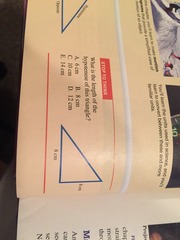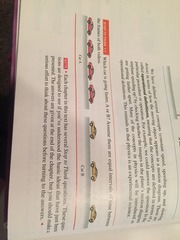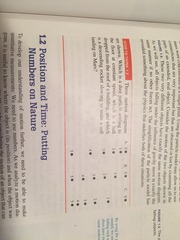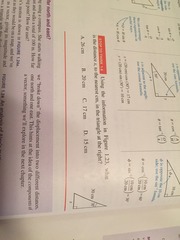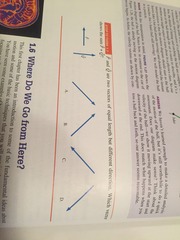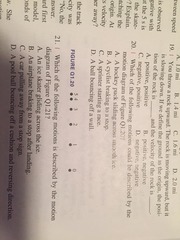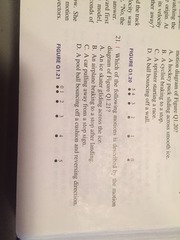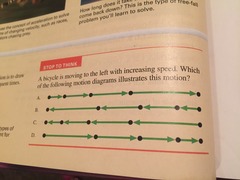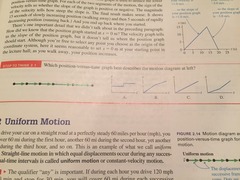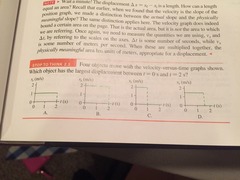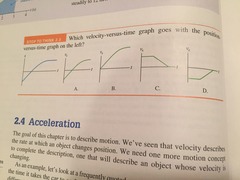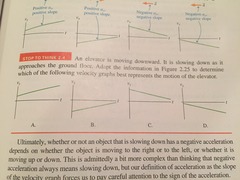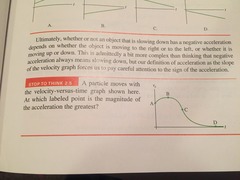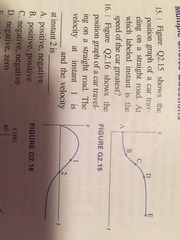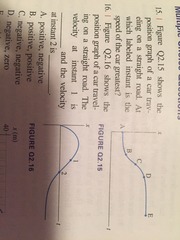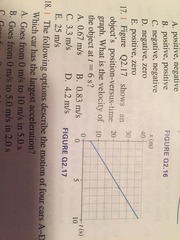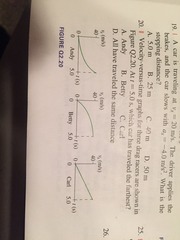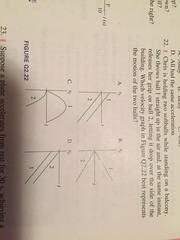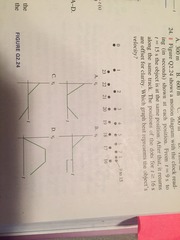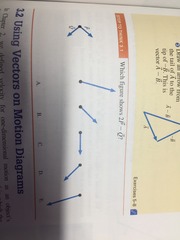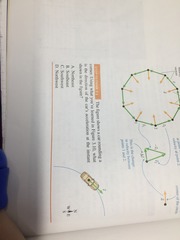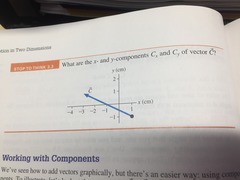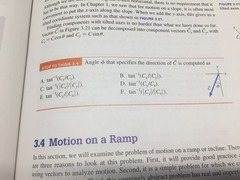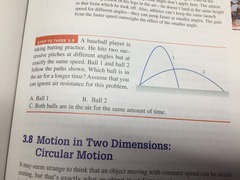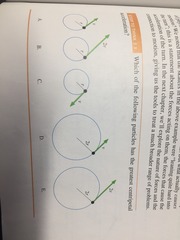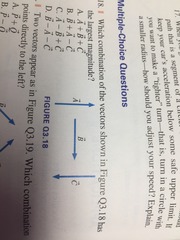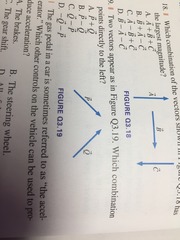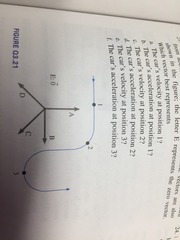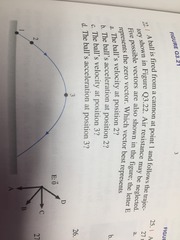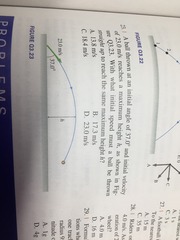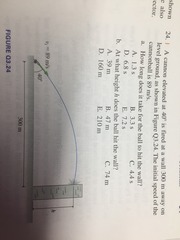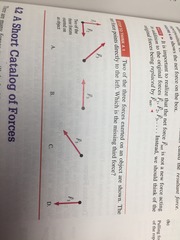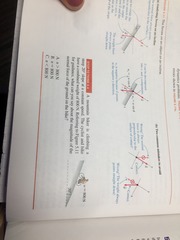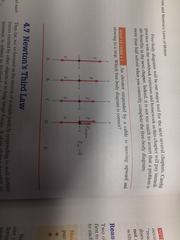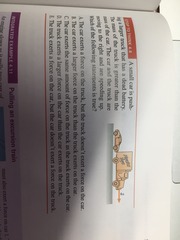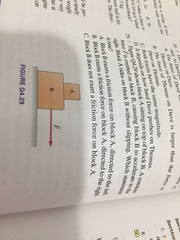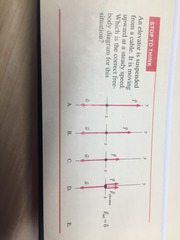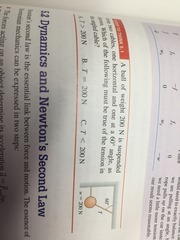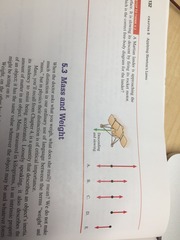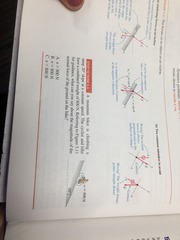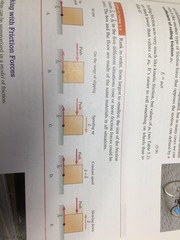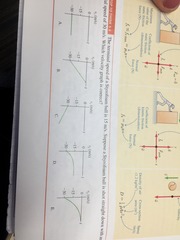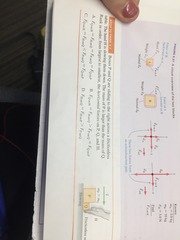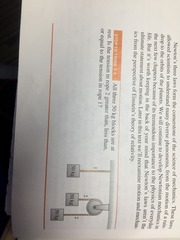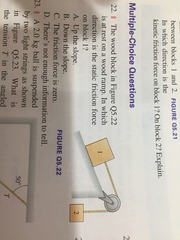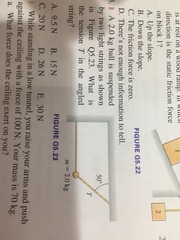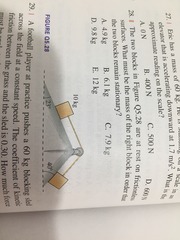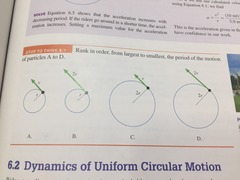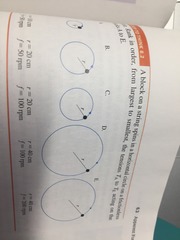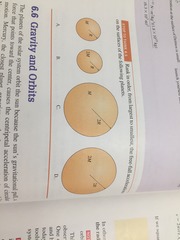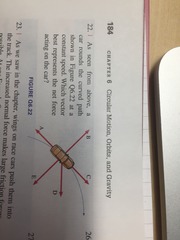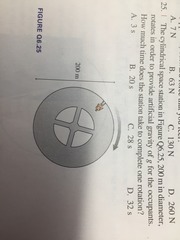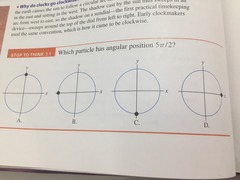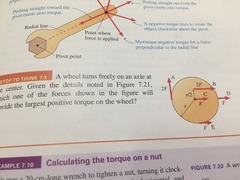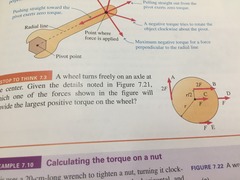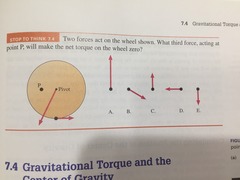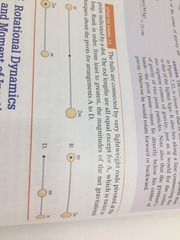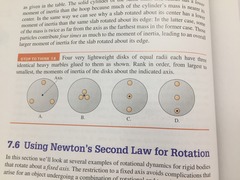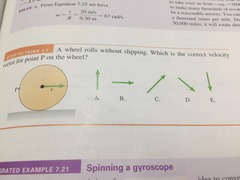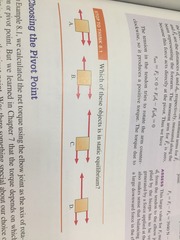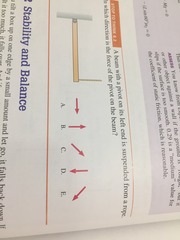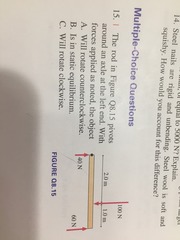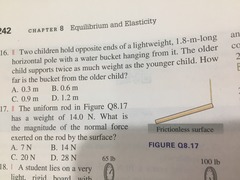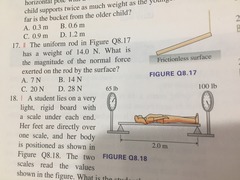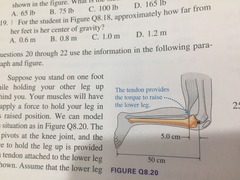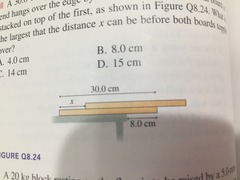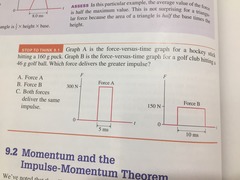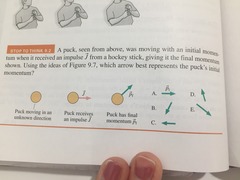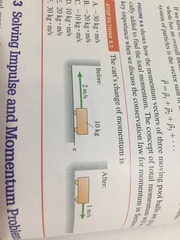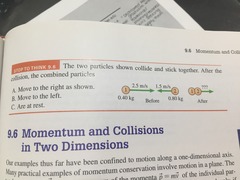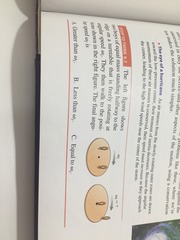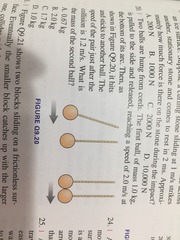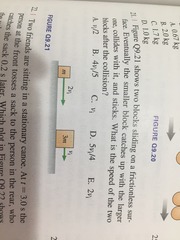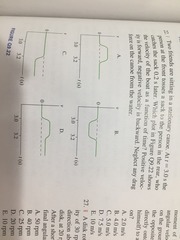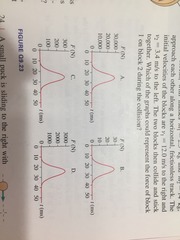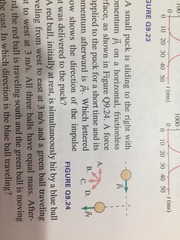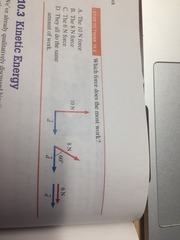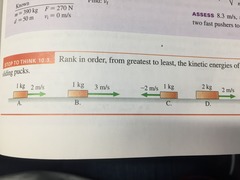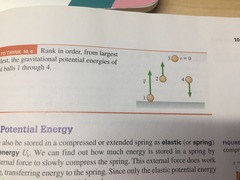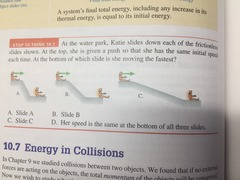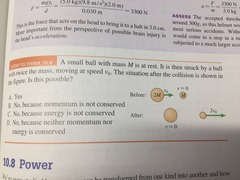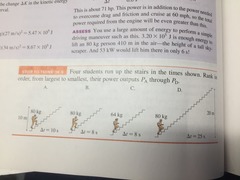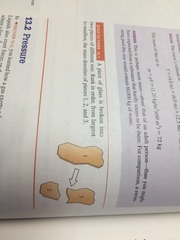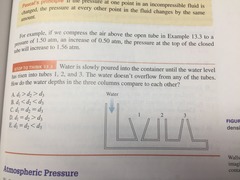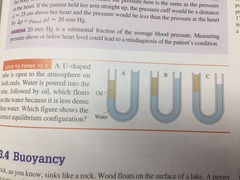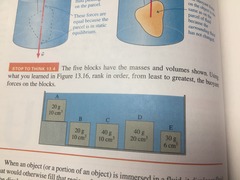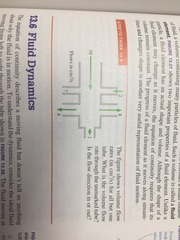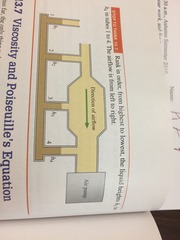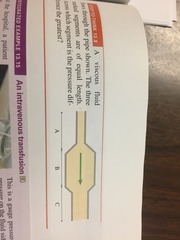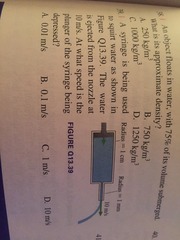C 10 cm
STT 1 What is the length of the hypotenuse of this triangle? ( 6 and 8 cm)
A 6 cm
b 8 cm
C 10 cm
D 12 cm
E 14 cm
B
STT 1.1 Which car is going faster? A or B? Assume they are equal intervals of time in between both videos
A, Dust particle
b dropping ball.
c descending rocket
STT 1.2 Three motion diagrams are shown. Which is a dust particle settling to the floor at constant speed, which is a ball dropped from the roof of a building and which is a descending rocket slowing to make a soft landing on mars?
C Could be either positive or negative
STT 1.3 Sarah starts at a positive position along the x-axis. She then undergoes a negative displacement. Her final position
A is postive
B Is negative
C Could be either positive or negative
C 2 mph
STT 1.4 Jane starts from her house to take a stroll in her neighborhood. After walking for 2 hours at a steady pace, she has walked 4 miles and is 2 miles from home. For this time, what was her speed?
A 4 mph
B 3 mph
c 2 mph
D 1mph
D>C>B=A
STT 1.5 Rank in order from the fewest, the number of significant figures in the following numbers.
A .43
B .0052
C .430
D 4.321 X 10^-10
D 15 cm
STT 1.6 Using the information in figure 1.23 what is the distance to the nearest CM in the triangle at the right?
A 26 cm
B 20 cm
C 17 cm
D 15 CM
B
STT 1.7 P and Q are two vectors of equal length but different directions. Which vector shows the sum of P + Q?
B 1.4 miles
1.18 A student walks 1.0 mi west and then 1.0 mile north, after ward how far is she from her starting point?
A 1.0 mi
B 1.4 mi
C 1.6 mi
D 2.0 Mi
A Positive, positive
1.19 You throw a rock upward. The rock is moving upward, but it is slowing down. As we define the ground as the origin, the position of the rock is _____ and the velocity of the rock is _____
A Positive, positive
B positive negative
C negative positive
D Negative Negative
B Cyclist breaking to a stop
1.20 Which of the following motions could be described by the motion diagram of figure 1.20?
A Hockey puck
B cyclist braking to a stop
C a sprinter starting a race
D a ball bouncing off the wall
C a car pulling away from a stop sign
1.21 Which of the following options is described by the motion of figure Q 1.21?
A an ice skater gliding across the ice
B An airplane braking to a stop after landing
C a car pulling away from a stop sign
D a pool ball bouncing off a cushion and reversing direction
C 3.6 km
1.22 A bird flies 3.0 KM due west and then 2.0 KM due north. what is the magnitude of the bird’s displacement?
A 2.0 km
B 3.0 km
C 3.6 km
D 5.0 km
B 1.0 M/S
1.23 Wedell seals make holes in sea ice so they an swim down to forage on the ocean floor below. Measurements for one seal showed that it dived straight down from such an opening reaching a depth of .30 km in a time of 5.0 minutes. What was the speed of the diving seal?
A .60 M/S
B 1.0 M/S
C 1.6 M/S
D 6.0 M/S
E 10 M/S
A 23 degrees
1.24 A bird flies 3.0 km due west and then 2.0 due north. Another bird flies 2.0 km due west and 3.0 KM due north. What is the angle between the net displacement vectors for the two birds?
A 23 Degrees
B 34 Degrees
C 56 degrees
D 90 degrees
B 13.4 Min
1.25 A woman walks briskly at 2.0 m/s how much wile will it take her to walk one mile?
A 8.3 min
B 13.4 min
C 21.7 min
D 30.0 Min
A
1.27 A rectangle has a length of 3.24 M and height of .532 m. To the correct number of sig figs is the area?
A 1.72 M
B 1.723 M
C
D
B 3.77 M
1.26 Computer 3.24 M + .532 M to the correct number of Significant figures
A 3.7 m
B 3.77 M
C 3.772 M
D 3.7720 M
D 1.44 X 10^17 S
1.28 The earth formed 4.57 X 10^9 years ago. What is this time in seconds?
A 1.67 X10^12 S
B 4.01 X 10^13 S
C 2.40 X 10^ 9 S
D 1.44 X 10^17 S
A 5.50 X 10^3 Kg/M^3
1.29 An objects average density P is defined as the ratio of its mass to its volume. P = M/V. The earth’s mass is 5.94 X 10^24 ks and its volume is 1.08 X 10^12 km^3. What is the earth’s average density?
A 5.50 X 10^3 Kg/M^3
B 5.50 X 10^6 Kg/M^3
C 5.50 X 10^9 Kg/M^3
d 5.50 X 10^12 Kg/M^3
B
STT 2 A bicycle is moving to the left with increasing speed. Which of the following motino diagrams illustrates this motion?
D
STT 2.1 Which position vs. time graph best describes the motion diagram to the left?
B
STT 2.2 Four objects move with the velocity-versus-time graphs shown. Which object has the largest displacement between t=0 and t=2s?
C
STT 2.3 Which velocity- versus time graph goes with the position versus- time graph on the left?
B
STT 2.4 An elevator is moving downward. IT is slowing down as it approaches the ground floor. Adapt the information in figure 2.25 to determine which of the following velocity graphs best represents the motion of the elevator?
C
STT 2.5 A particle moves with the velocity-versus-time graph shown here. At which labeled point is the magnitude of the acceleration the greatest?
E 5.0 S
STT 2.6 A cyclist is at rest at a traffic light. When the light turns green, has begins accelerating at 1.2 m/S^2. How many seconds after the light turns green does he reach his cruising speed of 6.0 M/S^2?
A 1.0 S
B 2.0 S
C 3.0 S
D 4.0 S
E 5.0 S
D;-30 M/S
STT 2.7 A volcano ejects a chunk of rock straight up at a velocity of vy= 30 m/s. Ignoring air resistance , what will be the velocity Vy of the rock when it falls back into the volcano’s crater?
A >30 m/s
B 30 m/s
C 0m/s
D -30 m/s
E <-30m/s
C
2.15 Figure Q 2.15 shows the position graph of a car traveling on a straight road. At which labeled instant is the speed of the car the greatest?
D
2.16 Figure 2.16 shows the position graph of a car traveling on a straight road. The velocity at instant 1 is ___ and the velocity at instant 2 is ____.
C
2.17 Figure Q 2.17 shows an object’s position-versus-time graph. What is the velocity off the object at T=6s?
D Goes from 0 M/S to 3.0 M/s in 1 S
2.18 The following options describes the motion of four cars !-D Which car has the largest acceleration?
A Goes from 0 M/S to 10 M/s in 5.0 S
B Goes from 0 M/S to 5.o m/s in 2.0 s
C Goes from 0 M/S to 20 m/s in 7.0 S
D Goes from 0 M/S to 3.0 M/s in 1 S
D 50 M
2.19 A car is traveling at vx= 20 m/s . The driver apples brakes and the car slows down at ax=-4.0 m/s^2 what is the stopping distance?
A 5.0 M
B 25 m
C 40 M
D 50 M
B, Betty
2.20 velocity vs time graphs for three drag racers are shown in figure Q2.20 at t=5.0 s which car has traveled the farthest?
A andy
B betty
C carl
D all have traveled the same distance
B betty
2.21 which of the three drag racers in question 20has the greatest acceleration at t=0?
A andy
B Betty
C Carl
A
2.22 Chris is holding two softballs while standing on a balcony. She throws ball 1 straight up in the air and, at the same instant, releases her grip on ball 2, letting it drop over the side of the building. Which velocity graph in figure Q 2.22 best represents the motion of the two balls?
A 300 M
2.23 suppose a plane accelerates from rest for 30 S, achieving a takeoff speed of 80 m/s after traveling a distance of 1200 M down the runway. A smaller plane with the same acceleration has a takeoff speed of 40 M/S. Starting from rest, after what distance will this smaller plane reach its takeoff speed?
A 300 m
B 600 M
C 900 M
D 1200 M
B
2.24 Figure 2.25 shows a motion diagram with the clock reading ( in seconds) shown at each position. From T = 9 s to t=15 S the object is at the same position. After that, it returns along the same track. The positions of the dots for T;or equal to 16 S are offset for clarity. Which graph best represents the object’s velocity?
B14 S
2.25 a car can go from 0 to 60 mph in 7.0 S Assuming that it could maintain the same acceleration at higher speeds, how long would it take the car to go from 0-120 MPH?
A 12 S
B 14 S
C 21 S
D 28 S
A,12 S
2.26 A car can go from 0 – 60 mph in 12 S. A second car is capable of twice the acceleration of the first car. Assuming that it could maintain the same acceleration at higher speeds, how much time will this second car take to go from 0-120 MPH?
A 12 S
B 9.0 S
C 6.0 S
D 3.0 S
D 20 M/s
STT 3 a player kicks a football straight up into the air . The ball takes 2 seconds to reach its highest point. Approx. how fast was the ball moving when it left the player’s foot?
A 5 m/s
B 10 m/s
C 15 M/s
D 20 M/s
A
STT 3.1 Which figure shows 2P – Q ?
B
STT 3.2 The figure shows a car rounding a corner. Using what you’ve learned in figure 3.10 what is the direction of the car’s acceleration at the instant shown in the figure?
A northeast
B southeast
C southwest
D northwest
-4 cm, +2 cm
STT 3.3 What are the X and Y components of CX and Cy in vector C?
c Inverse Tan (IcxI/I cyI)
STT 3.4 Angle that specifies the direction is computed as
A inverse Tan ( CX/CY)
B Inverse Tan ( cx/IcyI)
c Inverse Tan (IcxI/I cyI)
dInverse Tan ( cy/cx)
eInverse Tan ( cy/IcxI)
fInverse Tan ( IcyI/IcxI)
B Height 3 base 6
STT 3.5 A block of ice slides down a ramp. For which height and base is the acceleration the greatest?
A Height 4 cm Base 12 Cm
b Height 3 cm base 6 cm
C Height 2 cm Base 5 cm
D height 1m base 3
D
STT 3.6 The water in a river flows downstream at 3.0 M/s. A boat is motoring upstream against the flow at 5.0 m/s. What is the boats speed of relativity to the riverbank/
A 8.0 M/s
B 5.0 M/s
C 3.0 M/s
D 2.0 m/s
D 2 m
3.7 a 100 g ball rolls off a table and lands 2 m from the base of the table. A 200 g ball rolls of the same table with the same speed. How far does it land from the base of the table?
A ;1 m
B 1m
C between 1 and 2 meters
D 2 m
E between 2 and 4 m
F 4 M
A Ball 1
3.8 A baseball player is taking batting practice. He hits two successive pitches at different angles but at exactly the same speed. Ball 1 and ball 2 follow the paths shown. Which ball is in the air for a longer time? Assume that you can ignore air resistance for this problem.
A ball 1
B ball 2
C both balls are in the air for the same amount of time
B
STT 3.9 Which of the following has the greatest centripetal acceleration?
B B+A-C
3.18 Which combination of the vectors shown in figure 3.18 has the largest magnitude?
A A+B+C
B B+A-C
C A-B+C
D B-A-C
C q-p
3.19 Two vectors appear as in figure 3.19. Which combination points directly to the left?
A p+q
B P-Q
C q-p
D -Q-P
D all the above
3.20 The gas pedal in a car is sometimes referred to as the ” accelerator” which other controls on the vehicle can be used to produce acceleration?
A the bakes
B Steering wheel
C gear Shift
D all the above
A a
B e
C c
D a
E b
F a
3.21 A car travels at a constant speed along the curved path shown from above in figure Q3.21 Five possible vectors are also shown in the figure. Letter E represents the zero vector.
Which vector best represents
A the cars velocity at position 1
B the car’s acceleration at position 1?
C the car’s velocity at position 2?
D the car’s acceleration at position 2?
E the car’s velocity at position 3?
F the car’s acceleration at position 3?
A d
B a
c c
D b
3.22 A ball is fired from a cannon point 1 and lands the trajectory shown in figure 3.22. Air resistance may be neglected. Five possible vectors are also shown in the figure; the letter E represents the zero vector. Which vector best represents
A The ball’s velocity at position 2?
B the ball’s acceleration at position 2
C The ball’s velocity as position 3?
D The ball’s acceleration at position 3?
A 13.8 m/s
3.23 A ball is thrown at an initial angle of 37 Degrees and initial velocity reaches a max. height H, as shown in figure Q 3.23. With what initial speed must a ball be thrown straight up to reach the same max. height H?
A 13.8 M/S
B 17.3 M/S
C 18.4 M/S
D 23.0 M/S
A C 4.4 S
B D 160 M
3.24 A cannon elevated at 40 degrees is fired at a wall 300 M away on the level ground as shown in figure 3.23. The initial speed of the cannon ball is 3.89 m/s
A How long does it take for the ball to hit the wall?
A 1.3 S
B 3.3 S
C 4.4 S
B at what height h does the ball hit the wall
A 39 m
b 47 m
C 74 m
D 160 m
E 210 m
A A 2.0 S
B C 100 m
3.25 a car drives horizontally off a 73 m-high cliff at a speed of 27 m/s. Ignore air resistance
A how long will it take it to take the car to hit the ground?
A 2.0 s
B 3.2 S
C 3.9 S
D 4.9 S
E 5.0 SB approx. how far from the base of the cliff will the car hit?
A 75 m
B 90 m
C 100 m
D 170m
E 280 m
b 25 m
3.26 a football is kicked at an angle of 30 degrees with a speed of 20 m/s. To the nearest 5m, how far will the ball travel?
A 15m
b 25 m
C 35 m
D 45 m
C 8.0 m
3.27 Riders on a ferris wheel move in a circle with a speed of 4.0 m/s. As they go around, they experience a centripetal acceleration of 2.0 m/s^2 . What is the diameter of this particular ferris wheel?
A 4.0 m
B 6.o m
C 8.0 m
D 16 m
E 24 m
d 4g
3.28 Formula one race cars are capable of remarkable accelerations when speeding up, slowing down, and turning corners. At one track, cars round a corner that is a segment of a circle of radius 85 m at a speed of 68 m/s. What is the approximate magnitude of the centripetal acceleration in units of g?
A 1g
B 2g
C 3g
d 4g
e 5g
B, to the right
STT 4 A swan is landing on an icy lake, sliding across the ice and gradually coming to a stop. As the swan slides, the direction of the acceleration is
A to the left
B to the right
C upward
D downward
C
STT 4.1 two of the three forces exerted on an object are shown. The net force points directly to the left. Which is the missing third force?
C, there is a static friction directed up the slope
ST 4.2 A frog is resting on a slope. Given what you learned in figure 4.12 , what can you say about the friction force acting on the frog?
A there is no friction force
B there is a kinetic friction force directed up the slope
C there is a static friction directed up the slope
D there is a kinetic friction directed down the slope
E there is a static friction directed down the slope
B , right left
STT 4.3 A boy is using a rope to pull a sled to the right. What are the directions of the tension force and friction force on the sled respectively?
A Right , right
B right left
C Left right
D left left
A, B, D
STT 4.4 you’ve just kicked a rock, and it is now sliding across the ground about 2 meters in front of you. Which of these are forces acting on the rock?
List all that apply
A gravity, acting downward
B The normal force, acting upward
C The force of the kick, acting in the direction of motion
D Friction acting opposite the direction of motion
E air resistance, acting opposite the direction of motion
B 2 m/s^2
STT 4.5 Two rubber bands stretched to the standard length cause an object to accelerate at 2 m/s^2. Suppose another object with twice the mass is pulled by four rubber bands stretched to the standard length. What is the acceleration of this second object?
A 1 m/s^2
B 2 m/s^2
C 4 m/s^2
D 8 m/s^2
E 16 m/s^2
D
STT 4.6 Three forces act on a object. In which direction does the object accelerate?
C
STT 4.7 An elevator suspended by a cable is moving upward and slowing to a stop. Which free body diagram is correct?
C the car exerts the same amount of force on the truck as the car exerts on the truck
STT 4.8 a small car is pushing a larger truck that has a dead battery. The mass of the truck is greater than the mass of the car. The car and the truck are moving to the right and are speeding up. Which of the following statements is true?
A the car exerts a force on the truck, but the truck doesn’t exert a force on the car
B the car exerts a larger force on the truck than the truck exerts on the car
C the car exerts the same amount of force on the truck as the car exerts on the truck
D the truck exerts a larger force on the car than the car exerts on the truck
E the truck exerts a force on the car, but the car doesn’t exert a force on the truck.
C, a
4.21 A block has an acceleration a when pulled by a string. If two identical blocks are glued together and pulled with twice the original force, their acceleration will be
A (1/4 a)
b (1/2)a
C a
d 2a
e 4a
A, 10 kg
4.22 A 5.0 kg block has an acceleration of .20 m/s^2 when a force is exerted on it. A second block has an acceleration of .10 m/s^2 when subject to the same force. What is the mass of the second block?
A 10 kg
b 5.0 kg
c 2.5 kg
d 7.5 kg
D, down then up
4.23 Tennis balls experience a large drag force. A tennis ball is hit so that is goes straight up and then comes back down. The direction of the drag force is
A always up
b up then down
c always down
d down then up
A , increase
4.24 A group of students is making model cars that will be propelled by model rocket engines. These engines provide a nearly constant thrust force. The cars are light- most of the weight comes from the rocket engine- and friction and drag are very small. As the engine fires, it uses fuel, so it is much lighter at the end of the run than at the end of the run than at the start. A student ignites the engine in a car, and the car accelerates. As the fuel burns and the car continues to speed up, the magnitude of the acceleration will
A increase
b stay the same
C decrease
D, down the ramp, then up the ramp
4.25 a person gives a box a shove so that it slides up a ramp, then it reverses its motion and slides down. The direction of the force of friction is
A always down the ramp
B up the ramp and then down the ramp
c always down the ramp
d down the ramp and then up the ramp
D, immediately begin slowing down and eventually stop
4.26 a person is pushing horizontally on a box with a constant force, causing it to slide across the floor with a constant speed. If the person suddenly stops pushing on the box, the box will
A immediately come to a stop
b continue moving at a constant speed for a while, then gradually slow down to a stop
C immediately change to a slower but constant speed
D immediately begin slowing down and eventually stop
C, downward then upward
4.27 as shown in the chapter, scallops use jet propulsion to move from one place to another. Their shells make them denser than water , so they normally rest on the ocean floor. If a scallop wishes to remain stationary, hovering a fixed distance above the ocean floor, it must eject water _____ so that the thrust force on the scallop is ____
A upward, upward
B upward, downward
C downward, upward
D downward, downward
C both forces have the same magnitude
4.28 Dave pushed his four-year old son, Thomas across the snow on a sled. As dave pushed, Thomas speeds up. Which statement is true?
A the force of dave of Thomas is larger than the force of Thomas on dave
B the force of thomas on dave is larger than the force of dave on thomas
C both forces have the same magnitude
D it depends on how hard dave pushes Thomas
B Block B exerts a friction force on block A, directed to the right
4.29 Figure 4.29 shows block A sitting on top of block B. A constant force, F is exerted on block B, causing block B to accelerate to the right. Block A rides on block B without slipping. Which statement is true?
A Block exerts a friction force on block A
B Block B exerts a friction force on block A, directed to the right
C Block B does not exert a friction force on block A
B
STT 5 An elevator is suspended from a cable. It is moving upward at a steady speed. Which is the correct free body diagram for this situation?
A T ; 200 N
STT 5.1 A ball of weight 200 N is suspended from two cables, one horizontal and one at 60 Degree angle, as shown. Which of the following must be true about the tension in the angled cable?
A T ; 200 N
B T=200 N
C T;200 N
A
STT 5.2 A martian lander is approaching the surface. It is slowing its descent by firing its rocket motor. Which is the correct FBD for the lander?
d zero
STT 5.3 You’re bouncing up and down on a trampoline.. After you have left the trampoline and are moving upward, you apparent weight is
A more than your true weight
b less
c equal
d zero
c n<800 n
STT 5.4 A mountain biker is climbing a steep 20 degree slope at a constant speed. The cyclist and bike have a combined weight of 800 N. Referring to 5.11 for guidance, what can you say about the magnitude of the normal force of the ground on the bike?
A n>800 n
B n=800 n
c n<800 n
fb>fc=fd=fe>fa
STT 5.5 Rank in order from largest to smallest, the size of the friction forces Fa to Fe in the five different situations ( one or more frictions could be zero). The box and the floor are made of the same situations in all situations.
D
STT 5.6 The terminal speed of a styrofoam ball is 15 m/s. Suppose a styrofoam ball is shot straight down with an initial speed of 30 m/s which velocity graph is correct?
B F Q on H = F H on Q> F P on Q = F Q on P
STT 5.7 Boxes P and Q are sliding to the right across a frictionless table. The hand, H is slowing them down . The mass of P is larger than the mass of Q. Rank in order from largest to smallest, the horizontal forces of P,Q and H
A F Q on H = H on Q= F Pon Q= F Q on P
B F Q on H = F H on Q> F P on Q = F Q on P
C F Q on H = F H on Q , F P on W = F Q on P
D F H on Q= F H on P > F P on Q
Equal to
STT 5.8 All three 50 kg blocks are at rest. Is the tension in rope 2 greater than, less than or equal to the tension on rope 1?
D, there’s not enough info to tell
5.22 The wood block in figure 5.22 is at rest on a wood ramp. In which direction is the static force on block 1?
A up the ramp
B down the ramp
C the friction force is 0
D There’s not enough information to tell
D 26 n
5.23 A 2.0 KG ball is suspended by two light strings as shown in figure 5.23. What is the tension T in the angled string?
A 9.5 N
B 15N
C 20 N
D 26 n
e 30 N
5.24 While standing in a low tunnel, you raise your arms and push against the ceiling with a force of 100 N. You mass is 70 kg.
A what force does the ceiling exert on you?
A 10 N
B 100 N
C 690 N
D 790 N
E 980 NB What force does the floor exert on you?
A 10 N
B 100 N
C 690 N
D 790 N
E 980 N
A B 43 N,
B, D 43 N
5.25 A 5.0 KG dog sits on the floor of an elevator that is accelerating downward at 1.20 M/s^2
A What is the dogs magnitude of the normal force of the elevator floor on the dog?
A 34 N
B 43 N
C 49 N
D 55 N
E 74 NB What is the magnitude of the force on the dog on the elevator floor?
A 4.2 N
B 49 N
C 55 N
D 43 N
E 74 N
A C 3.0 M/s
B B 5.4 M/s
5.26 a 3.0 KG puck slides due east on a horizontal frictionless surface at a constant speed of 4.5 M/s. Then a force of magnitude of 6.0 N, directed due north, is applied for 1.5 s. Afterward.
A. What is the northward component of the puck’s velocity?
A .50 M/s
B 2.0 M/s
C 3.0 M/s
D 4.0 m/s
E 4.5 M/s
B What is the speed of the puck?
A 4.9 M/s
B 5.4 M/s
C 6.2 M/s
D 7.5 M/s
E 11 M/s
C, 500 N
5.27 Eric has a mass of 60 kg. He is standing on a scale in an elevator that is accelerating downward at 1.7 m/s^2 . What is the approx. reading on the scale?
A 0 N
B 400 N
C 500 N
D 600 N
B, 6.1 kg
5.28 The two blocks in figure 5.28 are at rest on frictionless surfaces. What must be the mass of the right block in order for the two blocks to remain stationary?
A 4.9 KG
B 6.1 KG
C 7.9 KG
D 9.8 KG
E 12 kg
C, 180 N
5.29 A football player at practice pushed a 60 kg blocking sled across the field at a constant speed. The coefficient of kinetic friction between the grass and the sled is .30. How much force must he apply to the sled?
A 18 N
B 60 N
C 180 N
D 600 N
B .68 M
5.30 Two football players are pushing a 60 kg blocking sled across the field at a constant speed of 2.0 M/s. The coefficient of kinetic energy between the grass and sled is .30. Once they stop pushing, how far will the sled slide before coming to rest?
A .20 M
B .68 M
C 1.0 M
D 6.6 M
D, 1.0
5.31 Land rover ads used to claim that their vehicles could climb a slope of 45 Degrees. For this to be possible, what is the minimum coefficient of static friction between the vehicle’s tires and the roads?
A .5
B .7
C .9
D 1.0
A, 230 M
5.32 A truck is traveling at 30 m/s on a slippery road. The driver slams on the brakes and the truck starts to skid. If the coefficient of kinetic friction between the tires and the road is .20, how far will the truck skid before stopping?
A 230 M
B 300 M
C 450 M
D 680 M
D, directed right
STT 6 A softball Pitcher is throwing a pitch. At the instant shown, the ball is moving in a circular arc at a steady speed. At this instant speed, the acceleration is
A directed up
B directed down
C directed left
d directed right
e Zero
C.D=A>B
STT 6.1 Rank in order from largest to smallest, the period of the motion of particles A to D.
Ta<tb<tc<td<te
STT 6.2 A block on a string spins in a horizontal circle on a frictionless table. Rank in order from largest to smallest, the tensions TA to TE acting on the blocks A to E
B N<W
STT 6.3 A car is tolling over the top of a hill at constant speed V. At this instant,
A N > W
B N<W
C N=W
D We cant tell about n without knowing W
B increasing the height of the satellite about the surface
STT 6.4 A satellite is in a low earth orbit. Which of the following changes would increase the orbital period?
A increasing the mass of the satellite
B increasing the height of the satellite about the surface
C increasing the value of G
B>a>d>c
STT 6.5 Rank in order from largest to smallest, the free-fall accelerations on the surfaces of the following planets
A, a month gets longer
STT 6.6 Each year , the moon gets a little bit farther away from the earth increasing the radius of its orbit. How does this change affect the length of a month?
A a month gets longer
B A month gets shorter
C the length if a month stays the same
D, 24 N
6.21 A ball on a string moves around a complete circle, once a second, on a frictionless , horizontal table. The tension in the string is measured to be 6.0 N. What would the tension be if the ball went around in only half a second?
A 1.5 N
B 3.0 N
C 12 N
D 24 N
E
6.22 As seen from above, a car rounds the curved path shown in figure Q6.22 at a constant speed. Which vector best represents the net force acting on the car?
E 30,00 N
6.23 As we saw in the chapter , wings on race cars push them into the track. The increased normal force makes large friction forces possible. At one formula one racetracks, cars turn around a half circle with diameter 190 m at 68 m/s. For a 610 kg vehicle, the approx. minimum static friction force is complete this turn is
A 6000 N
B 15,000 N
C 18,000 N
D 24,000 N
E 30,000 N
C 130 N
6.24 Suppose you and a friend, each of mass 60 kg, go to the park and get on a 4.0 m- diameter merry- go round , while your friend pushes outside edge of the merry-go-round, while your friend pushes so that it rotates once every 6.0 s. What is the magnitude of the (apparent) outward force that you feel?
A 7 N
B 63 N
C 130 N
D 260 N
B 20 s
6.25 The cylindrical space station in figure Q6.25 , 200 m diameter rotates in order to provide artificial gravity of g for the occupants. How much time does the station take to complete one rotation?
A 3 s
B 20 S
C 28 s
D 32 S
B 2t
6.26 Two cylindrical space stations, the second four times the diameter of the first, rotate so as to provide the same amount of artificial gravity. If the first station makes one rotation in the time T, then the second station makes one rotation on time
A t/4
B 2t
c 4t
D 16 T
A greater than that for an earth satellite
6.27 The radius of jupiter is 11 times that of earth, and the free fall acceleration near its surface is 2.5 times that on earth. If we someday put a spacecraft in low jupiter orbit, its orbital speed will be
A greater than that for an earth satellite
B the same as that for an earth satellite
C less than that for an earth satellite.
A 2/9 g
6.28 A newly discovered planet has twice the mass and three times the radius of the earth. What is the free-fall acceleration g at the surface of the earth?
A 2/9 g
B 2/3 g
c 3/4 g
d 4/3 g
A 2.5 m/s^2
6.29 Suppose one night the radius of the earth doubled but its mass stayed the same. What would be an approx. new value for the free-fall accel. at the surface of the earth?
A. 2.5 m/s^2
B 5.0 M/s^2
C 10 M/s^2
D 20 M/s^2
C less than 27.3 days
6.30 currently the moon goes around the earth once every 27.3 days. If the moon could be brought into a new circular orbit with a smaller radius, its orbital period would be
A more than 27.3 days
B 27.3 days
C less than 27.3 days
D T2 = 8T1
6.31 Two planets orbit a star. You can ignore the gravitational interactions between the planets. Planet 1 has orbital radius r1 and planet 2 has radius r2=4r1. Planet 1 orbits with period T1. Planet 2 orbits with period
A t2=1/2 T1
B T2= 2T1
c t2= 4t1
D T2=8T1
B
STT 7 As an audio CD plays, the frequency at which the disk spins changed. At 210 rpm, the speed of a point on the outside edge of the disk is 1.3 m/s. At 420 rpm, the speed of a point on the outside edge is
a 1.3 m/s
B 2.6 m/s
C 3.9 m/s
D 5.2 m/s
A
STT 7.1 Which particle has angular position 5Pi/2
a constant but not zero,
b constant but not zero
c constant but not zero
D zero
e zero
STT 7.2 A ball on the end of a string swings in a horizontal circle once every second. State whether the magnitude of each of the following quantities is zero constant ( not but zero) or changing.
A velocity
B angular velocity
C centripetal acceleration
D angular acceleration
E tangential acceleration
E
STT 7.3 A wheel turns freely on an axel at the center. Given the details noted in figure 7.21, which one of the forces shown in the figure will provide the largest positive torque on the wheel?
A
STT 7.4 Two forces act on the wheel shown. What third force, acting at point P, will make the net torque on the wheel zero?
Tb>td>ta= tc
STT 7.5 The balls are connected by very lightweight rods pivoted at the point indicated by a dot. The rod lengthens are all equal except for A, which is twice as long. Rank in order, from least to greatest, the magnitudes of the net gravitational torques about the pivots for arrangements A to D
Id.>ia >ic>IB
STT 7.6 Four very lightweight disks are equal radii each have three identical heavy marbles glued to them as shown. Rank in order from largest to smallest, the moments of inertia of the disk about the indicated axis.
C
STT 7.7 A wheel rolls without slipping. Which is the correct velocity vector for point P on the wheel?
A 2.7 X 10^-5 kg X m^2
7.20 A typical compact disk has a mass of 15 g and a diameter of 120 mm. What is its moment of inertia about an axis through its center, perpendicular to the disk?
A 2.7 X 10^-5 kg X m^2
B 5.4 X 10^-5 kg X m^2
C 1.1 X 10^-4 kg X m^2
D 2.2 X 10^-4 kg X m^2
D 16
7.21 Suppose manufacturers increase the size of compact disks so that they are made of the same material and have the same thickness as a current disk but have twice the diameter. By what factor will the moment of inertia increase?
A 2
B 4
C 8
D 16
A, rod 1
7.22 Two horizontals rids are held up by vertical strings tied to their ends. Rod 1 has length, L and mass M; Rod 2 has length 2L and mass 2M. Each rod then has one of its supporting strings cut, causing the rod to begin pivoting about the end that is still tied up. Which rod has a larger initial angular acceleration?
A Rod 1
B Rod 2
B. Put the end of the barrel in your palm with the handle up
7.23 A baseball bat has a thick, heavy barrel and a think, light handle. If you want to hold a baseball bat on your palm so that it balances vertically, you should
A. put the end of the handle in your palm , with the barrel on top
B. Put the end of the barrel in your palm with the handle up
C. The bat will be equally easy to balance in either configuration
B pi rad
7.24 A particle undergoing circular motion in the xy plane stops on the positive y-axis. Which of the following does not describe its angular position?
A pi/ 2 rad
B pi rad
C 5 pi/ 2 rad
D -3pi/2 Rad
7.25 D 20 rad/s
7.26 C 300 m/s^2
7.27 D 15 m/s
7.25 What is the approx. angular speed of the skater during the leap?
A 2 rad/s
B 6 rad/s
C 9 rad/s
D 20 rad/s7.26 The skaters arms are fully extended during the jump. What is the approx. centripetal acceleration of the skater’s hand?
A 10 m/s^2
B 30 M/s^2
C 300 M/s^2
D 450 M/s^27.27 What is the approx. speed of the skater’s hand?
A 1m/s
B 3 m/s
C 9 m/s
D 15 m/s
D, not change, decrease
STT 8 An old fashioned tire swing exerts a force on the branch and a torque about the point where the branch meets the trunk. If you hang the swing closer to the trunk, this will _____ the force and ____ the torque.
A increase, increase
B not chance, increase
C not change, not change
D not change, decrease
E decrease, not change
F decrease, decrease
D
STT 8.1 Which of these objects is in static equilibrium?
B
STT 8.2 A beam with a pivot on its left end is suspended from a rope. In which direction is the force of the pivot on the beam?
B , a,c
STT 8.3 Rank in order from least stable to most stable, the three objects shown in the figure. The positions of their centers of gravity are marked. ( for the centers of gravity to be positioned like this, the objects must have been non uniform composition).
B 4 N to the right
STT 8.4 The end of a spring is pulled to the right by 4 cm; the restoring force is 8 N to the left. Given the relationships shown in figure 8.14 c , if the spring is returned to equilibrium and then pushed to the left by 2 cm, the restoring force is
A 4 N to the left
B 4 N to the right
C 8 N to the left
D 8 N to the right
E 16 n to the left
D 16 N to the right
C 15 cm
STT 8.5 A 1.0 kg weight is suspended from a spring, stretching it by 5.0 cm. Ho much does the spring stretch if the 1.0 kg weight is replaced by a 3.0 kg weight?
A 5 cm
B 10 cm
C 15 cm
D 20 cm
E 4 mm
STT 8.6 A 10 kg mass is hung from a 1-m long cable, causing the cable to stretch by 2 mm. Suppose a 10 kg mass is hung from a 2 m length of the same cable. By how much does the cable stretch?
A .5 mm
B 1 mm
C 2 mm
D 3 mm
E 4 mm
C, clockwise
8.15 The rod in figure Q8.15 pivots around an axle at the left end. With forces applied as notes, the object
A will rotate counterclockwise
B is in static EQ
C will rotate clockwise
B, .6
8.16 Two children hold opposite ends of a lightweight, 1.8 m-long horizontal pole with a water bucket hanging from it. The older child supports twice as much weight as the younger child. How far is the bucket from the older child?
A .3 m
B .6
C .9 m
D 1.2 m
A, 7 N
8.17 The uniform rod in figure 8.17 has a weight of 14 N What is the magnitude of the normal force exerted on the rod by the surface?
A 7 N
B 14 N
C 20 N
D 28 N
8.18 C, 165 lb
8.19 b, .8 m
8.18 A student lies on a very light, rigid board with a scale under each end. Her feet are directly under each end. Her feet are directly over one scale, and her body is positioned as shown in figure Q 8.18. The two scales read the values shown in the figure. What is the student’s weight?
A 65 lb
B 75 lb
C 100 lb
C 165 lb8.19 For the student in figure 8.18 approx. how far from her feet is the center of gravity?
A .6 M
B .8 M
C 1.0 m
D 1.2 m
8.20 B, 200 N
8.21 B, 160 N
8.22 A, 1.0 mm
((Knee picture ))
8.20 How much force must the tendon exert to keep the leg in this position?
A 40 N
B 200 N
C 400 N
D 1000 N
8.21 As you hold your leg in this position, the upper leg exerts a force on the lower leg at the knee joint. What is the direction of this force?
A 40 N
B 160 N
C 200 N
D 240 N
8.22 What is the magnitude of the force of the upper leg on the lower leg at the knee joint?
A 1.0 mm
B 1.4 mm
C 2.0 mm
D 4.0 mm
B 1.4 mm
Q 8.23 You have a heavy piece of equipment from a 1. mm diameter wire. Your supervisor asks what the length of the wire will be doubled without changing how far the wire stretches. What diameter must the new wire have?
A 1.0 mm
B 1.4 mm
C 2.0 mm
D 4.0 mm
c, 14 cm
8.24 a 30.0 cm long board is placed on a table such that its right end hangs over the end by 8 cm. A second identical board is stacked on top of the first. AS shown in figure Q 8.24. What is the largest that the distance x can be before both boards topple over
A 4.0 cm
B 8.0 cm
C 14 cm
D 15 cm
D. 13 mm
8.25 A 20 kg clock resting on the floor is to be raised by a 5.0 mm diameter rope with young’s modulus 1.5 X 10^9 n/M^2. The rope goes up and over a pulley that is 2.5 m above the floor. You hold the at a point 1.5 m above the flow and pull hard enough to lift the block just off the floor. By how much does the rope stretch?
A 3.0 mm
B 6.3 mm
C 9.3 mm
D 13 mm
C equal to the force of the hammer on the nail
STT 9 A hammer hits a nail. The force of the nail on the hammer is
A greater than the force of the hammer on the nail
B less than the force of the hammer on the nail
C equal to the force of the hammer on the nail
D zero
C both forces deliver the same impulse
STT 9.1 Graph A is the force-versus-time graph for a hockey stick hitting a 160 g puck. Graph B is the force-versus time graph for a gold club hitting a 46 g golf ball. Which force delivers the greater impulse?
A force A
B Force B
C both forces deliver the same impulse
D
STT 9.2 A puck, seen from the above, was moving with an initial momentum when it is received an impulse J from a hockey stick, giving it the final momentum shown. Using the ideas of figure 9.7, which arrows best represents the puck’s initial momentum?
F 30 kgX m/s
STT 9.3 The car’s change of momentum is
A -30 kgX m/s
B -20 kgX m/s
C -10 kgX m/s
D 10 kgX m/s
E 20 kgX m/s
F 30 kgX m/s
B the rubber ball receives a greater impulse because it bounces.
STT 9.4 A 10 g rubber ball and a 10 g clay ball are thrown at a wall with equal speeds. The rubber ball bounces ; the clay ball sticks Which ball receives the greater impulse from the wall?
A the clay ball receives a greater impulse because it sticks
B the rubber ball receives a greater impulse because it bounces.
C. The receive equal impulses because they have equal momenta
D. Neither receives an impulse because the wall doesn’t move.
Right end
STT 9.5 An explosion in a rigid pipe shoots three balls out of its ends. A 6 g ball comes out the right end. A 4 g ball comes out of the left and with twice the speed of the 6 g ball. From which end, left or right, does the third ball emerge?
B move to the left
STT 9.6 The two particles shown collide and stick together. After the collision, the combined particles
A move to the right as shown
B move to the left
C are at rest
B less than Wi
STT 9.7 The left figure shows two boys of equal mass standing halfway to the edge on a turntable that is freely rotating at angular speed Wi. They then walk to the positions shown in the right figure. The final angular speed Wf is
A greater than Wi
B less than Wi
C Equal to Wi
D 10,000 N
9.19 Curling is a sport played with 20 kg stones that slide across an ice surface. Suppose a curling stone sliding at 1 m/s strikes another, stationary stone and comes to rest in 2 ms. Approx. how much force is there on the stone during the impact?
A 200 N
B 1000 N
C 2000 N
D 10,000 N
A .67 kg
9.20 Two balls are hung from cords. The first ball , of mass 1.0 kg, is pulled to the side and released, reaching a speed of 2.0 m/s at the bottom of its arc. Then as shown in figure Q9.20 , it hits and sticks to another ball. The speed of the pair just after the collision is 1.2 m/s. What is the mass of the second ball?
A .67 kg
B 2.0 kg
C 1.7 kg
D 1.0 kg
D 5vi/4
9.21 Figure Q9.21 shows two blocks sliding on a frictionless surface. eventually the smaller block catches up with the larger one, it collides with it and sticks. What is the speed of the two blocks after the collision?
A vi/2
B 4vi/5
c vi
d 5vi/4
e 2Vi
A
9.22 Two friends are sitting in a stationary canoe. At T=3.0 S the person at the front tosses a sack to the person in the rear, who catches the sac .2 s later. Which plot in figure Q 9.22 shows the velocity of the boat as a function of time? Positive velocity is forward, negative velocity is backward. Neglect any drag force on the canoe from the water.
D
9.23 Two blocks with masses M1 = 2.5 kg and M2 = 14 kg approach each other along a horizontal, frictionless track The initial velocities of the blocks are v1 = 12 m/s to the right and v2 3.4 m/s to the left. The two blocks then collide and stick together. Which of the graphs could represent the force of block 1 on block 2 during the collision?
B
9.24 A small puck is sliding to the right momentum p on a horizontal, frictionless surface, as shown in figure Q 9.24. A force is applied to the puck for a short time and its momentum afterward is Pf. Which lettered arrows shows the direction of the impulse that was delivered to the puck?
C between north and west
9.25 A red ball initially at rest is simultaneously hit by a blue ball traveling from west to east at 3 m/s. All three balls have equal mass. Afterward, the red ball is traveling south and the green ball is moving to the east. In which direction is the blue ball traveling?
A West
B North
C Between north and west
D between north and east
E between south and west
C 5.0 m/s
9.26 a 4.0-m-diameter playground, merry-go-round , with the moment of inertia of 400 kg x M^2, is freely rotating with an angular velocity of 2.0 rad/s. Ryan, whose mass is 80 kg, runs on the ground around the outer edge of the merry-go-round in the opposite direction to its rotation. Still moving, he jumps directly onto the rim of the merry-go-round , bringing it( and himself) to a halt. How fast was Ryan running when he jumped on?
A 2.0 M/s
B 4.0 m/s
C 5.0 m/s
D 7.5 m/s
E 10 m/s
C 25 rpm
9.27 A disk rotates freely on a vertical axis with an angular velocity of 30 rpm. An identical rotates above it in the same direction about the same axis, but without touching the lower disk at 20 rpm. The upper disk then drops onto the lower disk. After a short time, because of friction, the rotate together. The final angular velocity of the disk is
A 50 rpm
B 40 rpm
C 25 rpm
D 20 rpm
E 10 rpm
A 10 m/s
STT 10 A car pulls away from a stop sign with a constant acceleration. After traveling 10 m, its speed is 5 m/s. What will its speed be after traveling 40 m?
A 10 m/s
B 20 m/s
C 30 m/s
D 40 m/s
D Ug -; Eth
STT 10.1 A child slides down a playground slide at constant speed. The energy transformation is
A Ug -;K
B K -; Ug
C W-; K
D Ug -; Eth
E K-;Eth
C 6 N force
STT 10.2 Which force does the most work?
A the 10 N force
B 8 N force
C 6 N force
D they all do the same amount of work
B;D;A=C
STT 10.3 Rank in order from greatest to least, the kinetic energies of sliding pucks
(Ug)3 ; (Ug)2 = (Ug)4 ; ( Ug)1
STT 10.4 Rank in order, from largest to smallest, the gravitational potential energies of identical balls 1 through 4
D 4 J
STT 10.5 When a spring is stretched by 5 cm, its elastic potential energy is 1 J. What will its elastic potential energy be if it is completely compressed by 10 cm?
A -4 J
B -2 J
C 2 J
D 4 J
B 2.0 M
STT 10.6 A block with an initial kinetic energy of 4.0 J comes to rest after sliding 1.0 m. How far would the block slide if it had 8.0 J of initial kinetic energy?
A 1.4 M
B 2.0 M
C 3.0 M
D 4.0 M
D Her speed was the same at the bottom of all three slides
STT 10.7 At a water park, katie slides down each of the frictionless slides shown. At the top, she is given a push so that she has the same initial speed each time. At the bottom of which slide is she moving the fastest?
A Slide A
B Slide B
C slide C
D her speed is the same at the bottom of all three slides
C no, because energy is not conserved
STT 10.8 A small ball with mass M is at rest. It is then struck by a ball with twice the mass, moving at speed V0. The situation after the collision is shown in the figure. Is this possible?
A yes
B no, because momentum is not conserved
C no, because energy is not conserved
D no, because neither momentum nor energy is conserved.
c thermal energy
STT 11.2 A runner is moving at a constant speed on level ground. Chemical energy in the runner’s body is being transformed into other forms of energy. Most of the chemical energy is being transformed into
A kinetic energy
b potential energy
c thermal energy
Pb > Pa = Pc > Pd
STT 10.9 Four students run up the stairs in the times shown. Rank in order, from largest to smallest, their power inputs Pa through Pd.
C 21 m/s
10.23 A roller coaster starts from rest at its highest point and then descends on it ( frictionless) track. Its speed is 30 m/s when it reaches ground level. What was its speed when its height was half of its starting point?
A 11 m/s
B 15 m/s
C 21 m/s
D 25 m/s
C both of you did equal work, but you expended more power
10.24 You and a friend carry a 15 kg suitcase up two flights of stairs, Walking at a constant speed. Take each suitcase to be the system. Suppose you carry your suitcase up the stairs in 30 s while your friend takes 60 s. Which of the following is true?
A you did more work, but both of you expended the same amount of power
B you did more work and expended more power
C both of you did equal work, but you expended more power
D both of you did equal work, but you expended less power
A 100 W
10.25 A woman uses a pulley and a rope to raise a 20 kg weight to a height of 2 m. If it takes 4s to do this, about how much power is she supplying?
A 100 W
B 200 W
C 300 W
D 400 W
C 4.0 cm
10.26 a hockey puck sliding along frictionless ice with speed v to the right collides with a horizontal spring and compresses it by 2.0 cm before coming to a momentary stop. What will be the spring’s maximum compression if the same puck hits it at a speed of 2v?
A 2.0 cm
B 2.8 cm
C 4.0 cm
D 5.6 cm
E 8.0 cm
C 3.6 m/s
10.28 A wrecking ball is suspended from a 5.0 m long cable that makes a 30 degree angle with the vertical. The ball is released and swings down. What is the ball’s speed at the lowest point?
A 7.7 m/s
B 4.4 m/s
C 3.6 m/s
D 3.1 m/s
C 3h/4
10.27 a block slides down a smooth ramp, starting from rest at a height h. When it reaches the bottom it’s moving at speed v. It then continues to slide up a second smooth ramp. At what height is its speed equal to v/2?
A h/4
B h/2
C 3h/4
D 2h
c 200 j
STT chapter 11 beginning
Christina throws a javelin in to the air. As she propel it forward from rest, she does 270 J of work on it. at its highest point, its gravitational potential energy has increased by 70 J. What is the javelines kinetic energy at this point?
A 270 j
B 240 J
c 200 j
d -200 j
e -340 j
C both use the same efficiency
STT 11.1 crane 1 uses 10 kj of energy to lift a 50 kg box to the roof of the building. Crane 2 uses 20 kj to life a 100 kg box the same distance. Which crane is more efficient?
A crane 1
b crane 2
C both use the same efficiency
C t1;t2
STT 11.3 Two samples of ideal gas, sample 1 and sample 2, have the same thermal energy. Sample 1 has twice the as many atoms as sample 2. What can we say about the temperatures of the two samples?
A t1;t2
B t1=t2
C t1;t2
C Q;0
STT 11.4 You have driven your car for awhile and now turn off the engine. Your car’s radiator is at a higher temperature than the air around it. Considering the radiator of a car as as the system, as the radiator cools down, we can say that
A Q>0
B Q=0
C Q<0
A,D
A increase TH
D Increase TC
STT 11.5 Which of the following changes ( there may be more than one) would increase the max. theoretical efficiency of a heat engine?
A Increase TH
B Increase TC
C Decrease TH
D Decrease TC
A ,D
A Increasing the temperature inside the fridge
D decreasing the temp of the kitchen
STT 11.6 Which of the following changes would allow your refrigerator to use less energy to run?
A Increasing the temperature inside the fridge
B increasing the temp of the kitchen
C decreasing the tmp inside the fridge
D decreasing the temp of the kitchen
B a ball rolls up a ramp, decreasing in speed as it rolls higher
STT 11.7 Which of the following processes foes not involve a change in entropy?
A an electric heater raised the temp ofa cup of water by 20C
B a ball rolls up a ramp, decreasing in speed as it rolls higher
C A basketball is dropped from 2 m and bounces until it comes to rest
D the sun shines on a black surface and warms it
C. The energy used while runner is greater, the power while running is greater.
11. 30 A person walks 1 km, turns around, and runs back to where he started. compare the energy used and the power during the two segments.
A. The energy used and the power are the same for both.
B. The energy used while walking is greater, the power while running is greater
C. The energy used while runner is greater, the power while running is greater.
D. The energy used is the same for both segments, the power while running is greater.
A Chemical Energy is being transformed into thermal energy
Ch 11.29 – A person is walking on level ground at constant speed. What energy transformation is taking place?
A. Chemical Energy is being transformed into thermal energy
B. Chemical Energy is being transformed into Kinetic energy
C. Chemical Energy is being transformed to kinetic energy and thermal energy
D. Chemical Energy and thermal energy are being transformed to kinetic energy
B. The total kinetic energy of the air is increasing and the average kinetic energy of the molecules is increasing.
11. 31 The temperature of the air in a basketball increases as it is pumped up. This means that
A. The total kinetic energy of the air is increasing and the average total kinetic energy of the molecules is decreasing
B. The total kinetic energy of the air is increasing and the average kinetic energy of the molecules is increasing.
C.The total kinetic energy of the air is decreasing and the average kinetic energy of the molecules is decreasing.
D. The total kinetic energy of the air is decreasing and the average kinetic energy of the molecules is increasing.
A. Gas 1
11. 32 200 J of heat is added to two gases, each in a sealed container. GAs 1 is in a rigid container that does not change with volume. Gas 2 expands as it is heated pushing out a piston that lifts a small weight. Which gas has the greatest increase in its thermal energy.
A. Gas 1
B. Gas 2
C. Both gasses have the same increase in thermal energy.
A. The first law of thermodynamics
11.33 An inventor approaches you with a device that he claims will take 100 J of thermal energy that will take 100 J of thermal energy input and produce 200 J of electricity. You decide not to invest your money because this device would violate
A. The first law of thermodynamics
B. The second law of thermodynamics
C. Both the second and third law of thermo dynamics
D. The second law of thermo dynamics applies in this situation, but it is not violated because the energy did not spontaneously go from cold to hot.
11.34 While keeping your food cold, your refrigerator transfers energy from the inside to the surroundings. thus thermal energy goes from a colder object to a warmer one. What can you say about this?
A. It is in violation of the second law of thermodynamics
B. It is not a violation of the second law of thermodynamics because refrigerators can have efficiency of 100%.
C. It is not a violation of the second law of thermodynamics because of the the second law does not apply to refrigerators.
D. The second law of thermo dynamics applies in this situation, but it is not violated because the energy did not spontaneously go from cold to hot.
D. 40 MJ
11.35 An electric power plant uses energy from burning coal to generate steam at 450 Degrees Celsius. The plant is cooled by 20 Degrees Celsius water from a nearby river. If burning coal provides 100 MJ of heat, what is the theoretical minimum amount of heat that must be transferred to the river during the conversion of heat to electric energy?
A. 100 MJ
B. 90 MJ
C. 60 MJ
D. 40 MJ
C. .13 J
11.36 A refrigerator freezer compartment is set at -10C; the kitchen is 24C. what is the theoretical minimum amount of electric energy necessary to pump 1.0 J of energy of the freezer compartment?
A. .89 J
B. .87 J
C. .13 J
D. .11 J
b+3000 J
STT before chapter 12
A blender does 5000 J of work on the food in its bowl. During the time the blender runs, 2000J of heat is transferred from the warm food to the cooler environment. What is the change in the thermal energy of the food?
a +2000J
b+3000 J
c + 7000 J
d -2000J
e-3000J
A helium
STT 12.1 Which of the system contains more atoms- 5 mol of helium( a=4) or 1 mol of neon? (A=20?)
A helium
B neon
C they have the same number of atoms
A A the rms of speed of the gas atom
B thermal energy of the gas
StT 12.2 a sample of ideal gas law is in a sealed container. The tmp of the gas and the volume of the container are both increased. what other properties of the gas necessarily change( more than one answer might be correct)
A A the rms of speed of the gas atom
B thermal energy of the gas
C the pressure of the gas
D the number of molecules in a gas
b 1/2
STT 12.3 What is the ratio of TF/TI for this process?
a 1/4
b 1/2
c a ( no change)
D 2
e 4
f there is not enough information to decide
A increase the temp of the ring and the rod
STT 12.4 An aluminum ring is tight around a solid iron rod, if we want to loosen the ring to remove it from around the rod, we should
A increase the temp of the ring and the rod
B decrease the temp of the ring and the rod
A the specific heat of water is larger than that of steam
STT 12.5 In figure 12.22 by comparing the slope of the graph during the time of liquid water is warming to the slope as steam is warming, we can say that
A the specific heat of water is larger than that of steam
B the specific heat of water is smaller than that of steam
C The specific heat of water is equal to that of steam
D the slope of the graph is not related to the specific heat
B <1 kg
STT 12.6 kg of barely molten lead at 328 degree C is poured into a large breaker of holding liquid water right at the boiling point, 100 Degrees C. What ist he mass of water that will be boiled way as the lead solidifies?
A 0kg
B <1 kg C 1 kg D >1 kg
A <50 C
STT 12.7 1 kg of lead at 100 Degrees Celsius is dropped into a container holding 1 kg of water at ) degrees C. Once the lead and water reach thermal EQ , the final temp is
A <50 C B 50 C C >50 C
c radiation
STT 12.8 Suppose you are an astronaut in the vacuum of space, hard at work in your sealed spacesuit. The only way that you an transfer heat to the environment is by
a conduction
b convection
c radiation
d evaporation
C. Greater than 35 PSI
12.27 A tire is inflated to a gauge pressure of 35 PSI. The absolute pressure in the tire is.
A Less than 35 PSI
B. Equal to 35 PSI
C. Greater than 35 PSI
D. Increases by a factor of 2
12.28 The number of atoms in a container is increased by a factor of 2 while the temperature is held constant. The pressure
A decreases by a factor of 4
B. Decreases by a factor of 2
C. Stays the same
D. Increases by a factor of 2
E. Increases by a factor of 4
C. Increases by a factor of 2
12. 29 A gas is compressed by an isotherm process that decreases its volume by a factor of 2. in this process, the pressure
A. Does not change
B. Increases by a factor of less than 2.
C. Increases by a factor of 2
E. Increases by a factor of more than 2.
D. It increases to twice its initial value.
12.30 The thermal energy of a container of helium gas is halved. What happens to the temperature, in kelvin?
A. It decreases to one-fourth its initial value.
B. It decreases to one-half its initial value.
C. It stays the same
D. It increases to twice its initial value.
D. Increases by a factor of more than 2.
12.31 A gas is compressed by an adiabatic process that decreases its volume by a factor of 2. In this process the pressure
A. Does not change.
B. Increases by a factor less than 2.
C. Increases by a factor of 2.
D. Increases by a factor of more than 2.
A. Cause you to underestimate the specific heat.
12.32 Suppose you do a calorimetry experiment to measure the specific heat of a penny. You take a number of pennies, measure their mass, heat them to a known temperature, and then drop them into a container of water at a known temperature. You then deduce the specific heat of a penny by measuring the temperature change of water. unfortunately you didn’t realize that you dropped one penny on the floor while transferring them to the water. This will-
A. Cause you to underestimate the specific heat.
B; Cause you to overestimate the specific heat
C. Not affect your calculation of specific heat
A. 72 G
12.33 A cup of water is heated with a heating coil that delivers 100W of heat. In one minute, the temperature of water rises by 20C. What is the mass of water?
A. 72 G
B. 140 G
C. 720 G
D. 1.4 KG
B. The second Beaker
12.34
Three identical beakers each hold 1000 g of water at 20C 100g of liquid water at 0C is added to the first beaker, 100 g of ice at 0C is added to the second beaker, and the third beaker gets 100G of aluminum at 0C. The contents of which container end up at the lowest final temperature?
A. The first Beaker.
B. The second Beaker
C. The third beaker
D. All end up at the same temperature
E. A water- steam mixture at 100C
12.35 100G of ice at 0C and 100 g of steam interact thermally in a well-insulated container. The final state of the system is
A. An ice-water mixture at 0C
B. Water at a temperature between 0C and 50C
C. Water at 50C
D. Water at a temperature between 50C and 100C
E. A water- steam mixture at 100C
B. 100 S
12. 36 Suppose the 600 W of radiation emitted in a microwave oven is absorbed by 250 g of water in a very light weight by 250 G of water in a very light weight cup. Approximately how long will it take to heat the water from 20 C to 80C?
A. 50 S
B. 100 S
C. 150 S
D 200 S
B. .057 KG
12.37 40,000 J of heat is added to 1.0 KG of ice at -10C how much ice melts?
A. .012 KG
B. .057 KG
C. .12 KG
D. 1.0 KG
B. Water is transferred to the skin as steam condenses
12.38 Steam at 100 C causes worse burns than liquid water. This is because
A Steam is hotter than water
B. Water is transferred to the skin as steam condenses
C. Steam has a higher specific heat than water
D. Evaporation of liquid on the skin causes cooling
c
STT 13 Three identical books are stacked vertically. The normal force of book 1 on book 2
A equal to the weight of one book
B less than the weight of one book
C greater than the weight of one book
All equal
STT 13.1 a piece of glass is broken into two pieces of different size. . Rank in order from largest to smallest, the mass densities of pieces 1, 2, 3
C
STT 13.2 Water is slowly poured into the container until the water level has risen into tubes 1, 2 and 3. The water doesn’t overflow from any tubes. How do the water depths in the three columns compare to each other?
A d1>d2>d3
B D1<d3 d3
E D1=d2<d3
C
STT 13.3 a U-shaped tube is open to the atmosphere on both ends. Water is poured into the tube, followed by oil, which floats on the water because it is less dense than water. Which figure shows the correct EQ configuration?
D > A > = B > E
STT 13.4 The five blocks have the masses and volumes shown. Using what you learned in figure 13.16 , rank in order, from least to greatest, the buoyant forces on the blocks
B
STT 13.5 An ice cube is floating in a glass of water that is filled entirely to the brim. When the ice cube melts, the water level will
A fall
B stay the same
C rise, causing the water to spill
1 cm out
STT 13.6 The figure shows volume flow rates ( in cm^3/s) for all but one tube. What is the volume flow rate through the unmarked tube?
IS the flow direction in or out?
h2 > h4 > h3 > h1
13.7 Rank in order from highest to lowest, the liquid height h1 to h4 in tubes in tubes 1 to 4. The airflow is from left to right
A
13.8 A vicious fluid flows through the pipe shown. The three marked segments are of equal length. Accross which segment is the pressure difference the greatest?
A
13.33 Figure 13.33 shows a 100 g block of copper and a 100 g block of aluminum. connected by a massless string that runs over two pulleys. The two blocks exactly balance, since they have the same mass. Now suppose that the whole system is submerged into water. What will happen?
A. the copper block will fall, the Aluminum block will rise
B the aluminum block will fall and the copper block will rise
C nothing will change
D both blocks will rise
B
13.34 Masses A and B rest on very light pistons, there is no friction between the pistons, and the cylinders the cylinders fit inside. Which of the following is true?
A Mass A is greater
B mass b is greater
C mass A and Mass B are the same
D 10 M
13.35 If you dive underwater , you notice an uncomfortable pressure on your ear drum, The human has an area of about 70 Mm ^2 and it can sustain a force of about 7 N without rupturing =. If your body has no means of balancing extra pressure, what would the max. depth be you could dive without rupturing your ear drum?
A .3 M
B 1 M
C 3 M
D 10 M
B sink
13.36 An 8.0 lb bowling ball has a diameter of 8.5 inches. When lowered into the water, the ball will A
Float
B sink
C have neutral buoyancy
C equal to
13.37 A large beaker of water is filled to the rim with water. A block o wood is then carefully lowered into the beaker until the block is floating. In this process, some water is pushed over the edge and collects in a tray. The weight of the water in the tray is
A greater than the weight of the block
B less than ”
C Equal to
B 750 kg/ m^3
13.38 An object floats in water with 75 % of its volume submerged. What is it’s approx. density?
A 250 Kg/m^3
B 750
C 1000
D 1250 Kg/M^3
B .1 m/s
13.39 A syringe is used to squirt water as shown in figure 13.39. The water is ejected from the nozzle at 10 m/s. What speed is the plunger of the syringe is being depressed?
A .01 m/s
B .1 m/s
C 1 m/s
D 10 m/s
D 12700 PA
13.40 Water flows through a 4.0 cm diameter horizontal pipe at a speed of 1.3 m/s. The pipe then narrows down to a diameter of 2.0 cm. Ignoring viscosity, what is the pressure difference between the wide and narrow sections of the pipe?
A 850 pa
B 3400 pa
C 9300 pa
D 12,700 pa
E 13,500 pA
A 1900 PA
13.41 A 15 m long garden hose has an inner diameter of 2.5 cm. One end is connected to a spigot; 20 degree C water flows from the other end at a rate of 1.2 L/s. What is the gauge pressure at the spigot end of the hose?
A 1900 pa
B 2700 pa
C 4200 pa
C 5800 pa
E 7300 pa
B. 10 CM
C. 1.6 HZ
C. The frequency would stay the same.
14.23 A spring has an unstretched length of 20cm. A 100 g mass hanging from the spring stretches it to an equillibrium length of 30 cm. What is the amplitude of the oscillation?
A. 5.0 Cm
B. 10 CM
C. 20 CM
D 40 CMFor the data, what is the frequency of the oscillation?
A .10 Hz
B .62 HZ
C. 1.6 HZ
D. 10Hz2C Suppose this experiment were done on the moon, where the free fall acceleration is approx. 1/16 of that on the earth. How would this change the frequency of the oscillation?
A. The frequency would decrease
B. The frequency would increase
C. The frequency would stay the same.
A – B
B-C
C -B
D-B
E-B
14.24 Figure Q14.24 represents the motion of a mass on a string. A What is the period of the oscillations?
A 12 S
B 24 S
C 36 S
D 48 S
E 50SB What is the amplitude of the oscillation?
a 1.0 cm
b 2.5 cm
c. 4.5 cm
D 5.0 cm
E 9.0 CmC What is the position of the mass at T = 30
a-4.5 cm
B -2.5 cm
C 0.0 cm
D 4.5 cm
E 30 cm
D when is the first thime the velocity of the mass is at zero?
a 0s
b 2s
c 8s
d 10s
e 13s
E At which of these times does the kinetic energy have its max. value?
a 0s
b 8s
c 13s
d 26s
e 30s
B,B,B,E,E
14.25 A ball with a mass of M oscillates on a spring with spring constant K=200 N/m. The ball’s position is
x=(0.350 m) cos(15.0t) with T measured in seconds
A) What is the amplitude of the ball’s motion?
A .175 m
B .350 m
c .700 m
d 7.50 m
E 15.0 mB) What is the frequency of the ball’s motion?
A .35 hz
B 2.39 hz
c 5.44 hz
d 6.28 hz
E 15.0 hzC) what is the value of mass m?
A .45 kg
b .89 kg
c 1.54 kg
d 3.76 kg
E 6.33 kg
D what is the total mechanic energy of the oscillator?
a 1.65 J
B 3.28 J
C 6.73 J
D 10.1 j
E 12.2 J
E What is the balls maximum speed?
A .35 m/s
B 1.76 m/s
C 2.60 m/s
D 3.88 m/s
E 5.35 m/s
C less than 1.o HZ
14.26 A car bounces up and down on its spring at 1.0 HZ with only the driver in the car. now the driver is joined by 4 friends. the new frequency of the oscillation when the car bounces on the springs is
A greater than 1.0 hz
B equal to 1.0 hz
C less than 1.o HZ
B The frequency will stay the same, frequency does not depend on the mass
14.27 If you carry heavy weights in your hands, how will this affect the natural frequency at which your arms swing back and forth/
A frequency will increase
B The frequency will stay the same
C The fluency will decrease
C 7.5 m
14.28 A heavy brass ball is used to make a pendulum with period of 5.5 s how long is the cable that connects the pendulum ball to the ceiling?
A 4.7 m
B 6.3 m
C 7.5m
D 8.7 m
A loud music with a mix of different frequencies
14.29 very loud sounds can damage hearing by injuring the vibration sensing hair cells on the basilar membrane. suppose a person has injured hair cells on a segment of the basilar membrane close to the stapes. what type of found is most likely to have produced this particular pattern of damage?
A loud music with a mix of different frequencies
B very loud, high-frequency sound
C very loud, low-frequency sound
A 14 cm
STT 14 beginning of the chapter A hanging spring has a length of 10 cm. A 100 g mass is hung from the spring, stretching it to 12 cm. What will be the length of the spring if this mass is replaced by a 200 g mass?
a 14 cm
B 16 cm
C 20 cm
d 24 cm
C the frequency is inversely proportional to the period, so a shorter period implies a higher frequency.
STT 14.1 two oscillating systems have periods t1 and t2, with t1< t2. how are the frequencies of the two systems related?
A f1f2
D The restoring force is proportional to the displacement.
STT 14.2 A ball is jung from a rope, making a pendulum. when it is pulled to 5 degrees to the side, the restoring force is 1.0 N. what will be the magnitude of the restoring force if the ball is pulled 10 degrees to the side?
A .5 n
B 1.0 n
C 1.5 n
D 2.0 N
B,A,C,B
STT 14.3 The graphs in the table above apply to pendulum motions as well as the motion of a mass on a spring. a pendulum in a clock has a period of 2.0 seconds you pull the pendulum to the right- a positive displacement- and let it go. we call this time t=0. at what time will the pendulum
A first be at it’s maximum negative displacement
B First have its maximum speed
C first have it’s maximum velocity
D first have its maximum positive acceleration?
a
STT 14.4 the figures show four identical oscillators at different points in their motion. Which i moving fastest at the time shown?
FD>FC=FB>FA
14.5 Four mass– spring systems have masses and spring constants shown here. rank in order from highest to lowest, the frequencies of the oscillations
C, it will run slower
14.6 A pendulum clock is made with a metal rod. It keeps perfect time at temperature 20 degrees celcius. at a higher temperature the rod lengthens. How will this change the clock’s timing?
A the clock will fun fast; the dial will be ahead of the actual time
B the clock will keep perfect time
C the clock will run slow; the dial will be behind the actual time
TD;TB=TC;TA
14.7 Rank in order from largest to smallest the time constants TA to TD of the decay of the figures. The scale on all the graphs are the same
D
STT 15 beginning of the chapter
A wooden toy hangs from a spring, when you pull it down and release it, it reaches the highest point of its motion after 1 s. What is the frequency of its oscillation?
a 2.0 hz
b 1.5 hz
c 1.0 hz
d .5 hz
Transverse
STT 15.1 Spectators at a sporting event do the wave as shown in the photo on the preceding page. Is this a transverse of a longitudinal wave?
D use a lighter string of the same length under the same tension
E stretch the string tighter to increase the tension
STT 15.2 suppose you shake the end of a stretches string to produce a wave. which of the following actions would increase the speed of the wave down the string? There may be more than one correct answer; if so, give all that are correct.
A move your hand up and down more quickly as you generate the wave
B move your hand up and down a greater distance as you generate the wave
C use a heavier string of he same length under the same tension
D use a lighter string of the same length under the same tension
E stretch the string tighter to increase the tension
F loosen the string to decrease the tension.
A
STT 15.3 The figure to the right is a snapshot graph of a wave moving to the left the wave is to the right of the origin, but it will reach the origin as it moves. construct a history graph for the motion of the marked point at the origin following the approach shown in figure 15.7. Which of the graphs is the correct history graph?
B
STT 15.4 Three waves travel to the right with the same speed. which wave has the highest frequency? all three graphs have the same horizontal scale
C Infrared has a longer wavelength and lower frequency than ultraviolet
STT 15.5 Comparing two different types of electromagnetic waves infrared and ultraviolet, we can say that
A infrared has a longer wavelength and higher frequency than ultraviolet
B infrared has a shorter wavelength and higher frequency than ultraviolet
C Infrared has a longer wavelength and lower frequency than ultraviolet
D Infared has a shorter wavelength and lower frequency than ultraviolet
A the plane wave
STT 15.6 a plane wave, a circular wave and a spherical wave all have the same intensity. Each of the waves travel the same distance. Afterward, which wave has the highest intensity?
A the plane wave
B the circular wave
C The spherical wave
b 60 dB
STT 15.7 You are overhearing a very heated conversation that registers 80 dB. you walk some distance away so that the intensity level decreases by a factor of 100. what is the sound intensity now?
a 70 db
b 60 dB
C 50dB
D 40dB
E 30dB
F 20dB
C F amy ; f zach
STT 15.8 Amy and Zach are both listening to the source of the sound waves that is moving to the right. Compare the frequencies of both.
A F amy ; F zach
B F amy = f zach
C F amy ; f zach
B Kool 2.85
MCQ 15.20 Denver, colorado has an oldies station that calls itself ” kool 105″ this means that they broadcast radio waves at a frequency of 105 MHz. Suppose that they decide to describe their station by its wave length in meters instead of by frequency, what name would they use now?
a Kool 0.35
b Kool 2.85
c Kool 3.5
D Kool 285
D 7.50 X 10^14 Hz
15.21 What is the frequency of blue light with a ave length of 400 nm ?
A 1.33 X10^3 hz
B 7.50 X 10^12 HZ
C 1.33 X 10^13 Hz
D 7.50 X 10^14 Hz
C 6.3 Cm
15.22 Ultrasound can be used to deliver energy to tissues for therapy. It can penetrate tissue to a depth of approx. 200 times its wave length. What is the approx. depth of penetration of ultrasound at a frequency of 5.0 MHZ?
A .29 mm
B 1.4 cm
C 6.3 Cm
D 17 cm
D 160 cm/s
15. 23 a sinusoidal wave traveling on a string has a period of .20 s a wave length of 32 cm and an amplitude of 3 com. what is the speed of the wave?
A .60 cm/s
B 6.4 cm/s
C 15 cm/s
D 160 cm/s
C velocity decreases
15.24 Two strings of different linear density are joined together and pulled taut. a sinusoidal wave on the string is traveling to the right, as shown in figure 15.24. When the eave goes across the boundary from string 1 to string 2, the frequency is unchanged, what happens to the velocity?
A velocity increases
B velocity stays the same
C velocity decreases
D it moves away from you until t=2s it then reverses direction and moves toward you, but doesn’t reach you.
15.25 you stand at X=o m listening to a sound that is emitted at frequency Fs. The figure shows the frequency you hear during a four-second interval.which of the following describes the motion of the second source?
A it moves from left to right and passes you at t=2s
B it moves from right to left and passes you at t=2s
C it moves toward you but doesn’t reach you. It then reverses direction at t=2s
D it moves away from you until t=2s it then reverses direction and moves toward you, but doesn’t reach you.
D
STT beginning chapter 16 a 170 HZ wave in air has a wavelength of 2.0 m. The frequency is now 340 HZ what is the new wavelength?
a 4.0 m
b 3.0 m
c 2.0 m
d 1.0 m
C
STT 16.1 Two pulses on a string approach each other at speeds of 1 m/s . What is the shape of the string at t=6s?
D 2.0 M
STT 16.2 A standing wave is se t up on a string. a series of snapshots of the wave are superimposed to produce the diagram off on the right. What is the wavelength>
A 6.0 M
B 4.0 M
C 3.0 M
D 2.0 M
E 1.0 M
C M= 5 .80m
STT 16.3 a 2 m long string carries a standing wave as in the figure to the right. Extend the pattern and the formulas shown in 16.13 to determine the mode number and the wavelength of this particular standing- wave mode
A M=6 .67 m
B M= 6 .80 m
C M= 5 .80m
D M=5 1.0 m
E M= 4 .80m
F m= 4 1.0m
C
STT 16.4 A standing wave on a string is shown. Which of the models below has twice the frequency of the original wave?
B 100 Hz
STT 16.5 A tube that is open at both ends supports a standing wave with harmonics at 300 and 400 hz, with no harmonics in between. What is the fundamental frequency of this tube?
A 50 hz
B 100 Hz
C 150 Hz
D 200 Hz
E 300 Hz
C The pattern of resonance frequencies of your vocal tract has changed, thus changing the formants
STT 16.6 if you speak at a certain pitch, then hold your nose and continue speaking at the same pitch, your voice sounds very different. This is because
A the fundamental frequency of your vocal cords has changed
B the frequencies of the harmonics of your vocal cords has changed
C The pattern of resonance frequencies of your vocal tract has changed, thus changing the formants
Constructive
STT 16.7 These speakers emit identical sound waves with a wave length of 1.0 m. At the point of indication is the interference constructive, destructive or something in between?
F Either B or C
STT 16.8 You hear three beats per second when two sound tones are generated. The frequency of one tone is known to be 610 hz. The frequency of the other is
A 605 hz
b 607 hz
C 613 hz
D 616 hz
E Either A or D
F Either B or C
D,a,B
16.18
Refer to the graph from the book
At T=1s what is the displacement y of the string at x=7cm?
A -1 cm
B 0mm
C .5 mm
D 1mm
E 2 mm16.19
At X=3cm what is the earliest time that y wil equal 2 mm?
a.5 s
B .7 s
c 1.0 s
d 1.5 s
e 2.5 s16.20 At t=1.5 s what is the value of y at x=10 cm
a -2.0 mm
b -1.0 mm
c -.5 mm
d 0mm
e 1.0 mm
D not enough information to decide
16.21 Two sinusoidal waves with the same amplitude A and frequency f travel in opposite directions along a long string, you stand at one point and watch the string. The maximum displacement of the string at that point is
A a
B 2a
C 0
D not enough information to decide
B 100 hz
16.22 A student in her physics lab measures the standing- wave modes of a tube. The lowest frequency that makes a resonance is 20 HZ. As the frequency is increased, the next resonance is at 60 HZ. What will the next resonance be after this?
A 80 hz
B 100 hz
C 120 hz
D 180 hz
A greater than 384
16.23 An organ pipe is tuned to exactly 384 hz when the temperature of the room is 20 Degrees Celsius. Later, when the air has warmed up to 25 degrees Celsius, the frequency is
A greater than 384
B 384 hz
C less than 384 hz
B 1700 hz, 5100 hz
16.24 resonances of the ear canal lead to increased sensitivity of hearing, as we’ve seen. Dogs have a much larger ear canal- 5.2 cm- than humans. What are the two lowest frequencies at which dogs have an increased in sensitivity? The speed of sound in the warm air of the ear is 350 m/s
A 1700 hz, 3400 hz
B 1700 hz, 5100 hz
C 3400, 6800 hz
3400, 10,200hz
D 40 m/s
16.25 The frequency of the lowest standing-wave mode on a 1.0 m long string is 20 hz. What i the wave speed on the string?
A 10 m/s
B 20m.s
C 30 m/s
D 40 m/s
D 550 hz
16.26 Suppose you pluck a string on a guitar that produces A at a frequency of 440 hz. Now you press your finger down on the string against one of the frets, making this point the new end of the string. The newly shortened string is 4/5 o the length of the full string. When you pluck the string, its frequency will be
A 350 hz
B 440 hz
C 490 hz
D 550 hz
